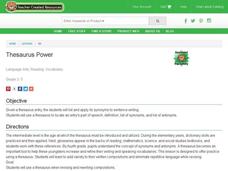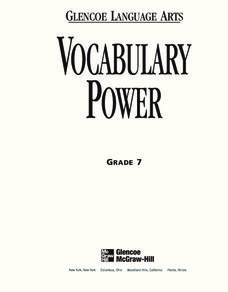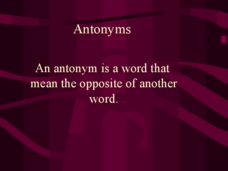Curated OER
Parts of Speech: Adjectives
What is an adjective? Read the informational paragraphs before having your elementary learners take the 10-question quiz. Learners distinguish between a group of words to find the adjective. Possessive adjectives and plural adjectives...
Curated OER
Roots and Affixes
Fourth and fifth graders review how words can have several parts, including; roots, prefixes, and suffixes. Pupils receive a word building tiles worksheet, embedded in the plan, and they record selected roots, prefixes, and suffixes in...
Curated OER
Glossaries
Explore text structure with a focus on the glossary feature in informational texts. Learners read a brief introduction before examining a glossary from a text about plants. They reference it while completing four comprehension questions....
Curated OER
Homographs
There are eight homograph riddles here: can your scholars figure them out? For each, there are three definitions and a picture. Learners use the picture and multiple meanings as clues, recording a word that matches all three. They read...
Curated OER
Using a Dictionary
What can we find in a dictionary? Your scholars may be surprised to hear that it's more than just definitions. They explore this resource by finding word meanings, uses, and origins in this vocabulary worksheet. Learners look up five...
Curated OER
Alphabetical Order
This is a vocabulary worksheet with a twist! Young elementary-schoolers put these 13 words into alphabetical order before finding their meanings, uses, and origins. They will need to use reference materials, and may need some help...
Curated OER
Thesaurus Power
Give your class the advantage of Thesaurus Power! They will use a thesaurus to understand word meanings and relationships. They focus on how a thesaurus functions and how it gives the entry word, definition, synonyms, antonyms, and part...
McGraw Hill
Vocabulary Power
Augment your language arts units with a set of vocabulary worksheets. The packet is an excellent support to your vocabulary instruction that covers a variety of skills, including context clues, Greek and Latin roots, reference materials,...
Curated OER
Understanding and Using Root Words to Expand Vocabulary
Middle schoolers engage in a lesson plan which reminds them that root words indicate the base meaning of a word, and that those roots are found in many different words that have similar meanings. Pairs of pupils use construction paper...
Curated OER
Pretending with Prefixes
The book Fortunately provides an excellent opportunity to discuss prefixes and suffixes as they appear in context. The class goes over a list of prefixes and suffixes with the teacher. They then write two sentences; the first including a...
Curated OER
Dictionaries
Introduce your budding readers to the dictionary. They read a brief introduction on dictionary features, observing pictures and examples of one-syllable words they could find in a dictionary. Using the word list, they determine which...
Curated OER
Introduce Vocabulary: Dinosaur Bones (Barner)
Dig into some prehistoric vocabulary in Bob Barner's informative book Dinosaur Bones. This works best if you introduce the primitive words before reading the story. These are the focus terms in the text: ancient, climate, extinct,...
Curated OER
Introduce Vocabulary: Have You Seen Bugs? (Oppenheim)
Are your scholars interested in bugs? Get future entomologists excited about vocabulary through Joanne Oppenheim's colorful book Have You Seen Bugs? They use the informational text (although this strategy is useful for any book) to learn...
Curated OER
Vocabulary and Concept Development: EDI
The roots metro/meter and therm are the focus of a vocabulary building presentation that includes concise definitions, color-coded examples, and opportunities for guided and independent practice. Part of a series of roots and affixes...
Curated OER
Subtracting Suffixes
Take it off! Take what off? Take off the suffixes to create new words! Learners build vocabulary and spelling skills as they remove the suffixes from 20 different words. This activity can help learners begin to recognize roots, compound...
Curated OER
Vocabulary Game
Help scholars discover new ways to build their vocabulary. Groups create a game involving their vocabulary words. Using the jigsaw model, the groups shuffle and play the games of the other groups. Save the games and use them for other...
Curated OER
The Amazing World of Dictionaries
Use this resource to discuss various ways to dictionaries can be used. What a terrific presentation to display when exploring how dictionaries are used to define words, check spellings, identify parts of speech, and more. The PowerPoint...
Curated OER
Antonyms: Opposite Words
Learning about antonyms can help learners build a diverse vocabulary and better understand word meaning and choice. They work through eight different sentences by determining which words are antonyms. This nicely designed presentation...
Curated OER
Homophone Search
Homophones take center stage in this engaging, interactive slide show. Students see that homophones are words that sound the same, but are spelled differently and have different meanings. They consider 20 slides which have sentences with...
Curated OER
Choose the Homograph
Practice homographs with this fun worksheet! Learners choose the meanings of ten homographs based on the sentence's context clues. The worksheet has a picture of bats - one flying mammal, and one used in baseball. Use this resource as a...
K12 Reader
Proverbs and Adages: What Do They Mean?
You shouldn't judge a book by its cover, but feel free to find the silver lining in a worksheet about common proverbs and adages. Learners read six popular adages and write their literal definitions on the lines provided.
Curated OER
Lesson 3: Idioms
You're as cute as a bug. But are you really as cute as a bug? Bugs aren't cute! Idioms are fun nonliteral phrases that mean something different than the words they contain. Second graders learn about idioms as they read the book, More...
Curated OER
Read, Write, and Draw
Numbers come in many forms, and they often appeal to different types of leaners. Explore these forms through six place-value problems which have youngsters represent values numerically, in word form, and through base-ten blocks. They...
Curated OER
Its or It's
What's the difference between its and it's? Clear up any misunderstandings in your third grade language arts class. Practice sentences use its or it's twice, prompting learners to use context clues for each usage. At the end of the...

























